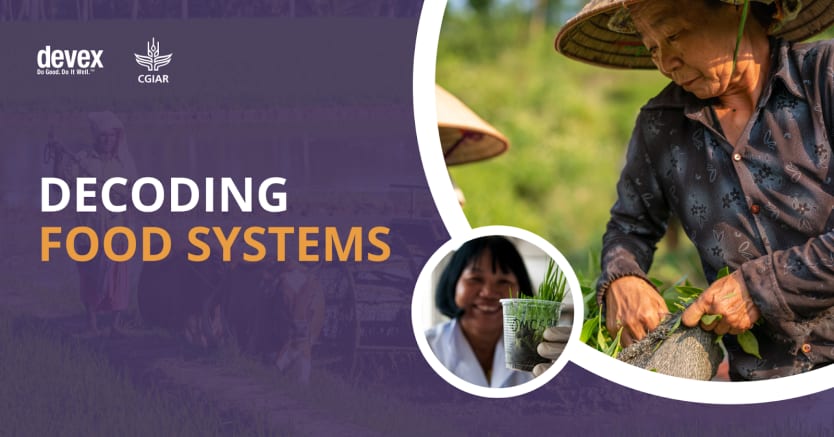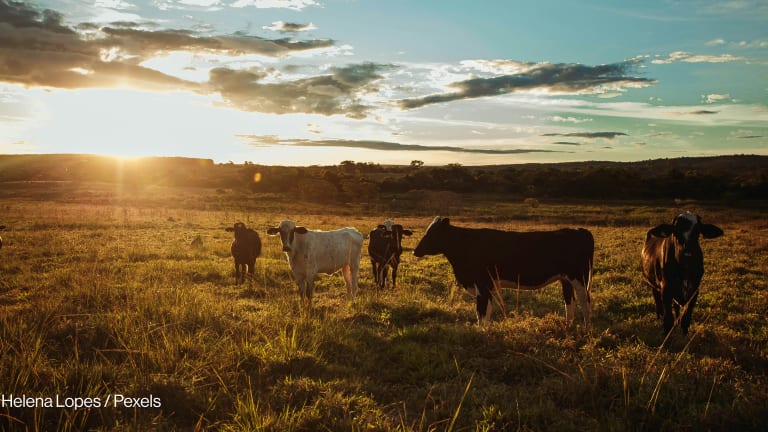
In the context of climate change, today’s livestock farmers — particularly rural smallholders — face a dual challenge: Their animals both emit the greenhouse gases, or GHGs (primarily methane), that contribute to climate change and are highly vulnerable to its effects through global warming. Rising temperatures can lead to heat stress, decreased availability of feed, and reduced milk production, affecting not only the animals, but also farmers’ livelihoods.
It’s not uncommon for farmers to select animals for traits such as improved production. But a three-year initiative by the CGIAR’s International Livestock Research Institute, or ILRI, gives farmers the power to select livestock that emit less methane and are better adapted to local climate conditions.
“EnviroCow is one of a number of projects around this issue of [climate] mitigation and methane in livestock systems,” Anthony Whitbread, program leader for livestock, climate, and environment at ILRI, told Devex.
By creating tools for phenotyping — recording and analyzing a set of observable traits within an organism — EnviroCow enables researchers to directly measure methane emissions in individual animals. The project has already collected data from around 800 animals across Tanzania and Kenya and started feeding data into national herding systems — data that could be crucial for plugging information gaps that are impeding countries’ progress towards global climate targets. We spoke with Whitbread to learn more.
This conversation has been edited for length and clarity.
What challenges do decision-makers face in supporting rural smallholders to make a living while still ensuring the country can meet its climate goals?
You need to balance the need for livelihoods and food security with building sustainable agricultural systems — and that means adaptation to inherent climate variability and climate change. You also have to mitigate the GHGs coming out of agricultural systems. A farmer might not have the mitigation aspect [at the top of] their mind, but they may have much more of a profit or livelihood motivation.
Many African and Asian countries are now signed up to the Paris Agreement [communicated through action plans known as Nationally Determined Contributions, or NDCs]. That requires countries to start identifying ways to mitigate or reduce their emissions.
But many African countries don't have local data available for their animals, breeds, or the sort of livestock and farming systems in operation in developed countries. We have to support more measurement and research to develop the emissions [information] that helps them connect to NDCs. ILRI’s role, through the Mazingira Centre, has been to undertake the science that creates the local data and supports local capacity to meet NDC requirements.
Can you explain more about EnviroCow and the science behind testing cattle’s genetic traits?
EnviroCow is about recognizing, within an animal herd, that there’s big genetic variation in traits, such as feed use efficiency and adaptation to stresses such as heat, humidity, and disease.
For generations, livestock keepers have selected animals for visual traits and productivity. This is a way of changing the genetic variation or makeup of a herd. EnviroCow is about trying to exploit genetic variation for animals that are able to more efficiently convert feed into milk.
But there’s also genetic variation that’s been discovered in how an animal produces methane when digesting forage and feed — that’s being quantified for the first time. … And we now understand that there’s some heritability of this trait.
Once you're able to measure traits such as methane efficiency, you can link that to the genetics of the animal, target those animals, and get them into breeding programs. That, over time, improves herd efficiency and productivity.

How do decision-makers translate this type of scientific data into actionable solutions?
The first thing is to help the industry or farmers find ways to exploit the existing genetic variation in existing herds, be that dairy, beef, sheep, and so on. [The second thing is that] there are a number of initiatives that ILRI and partners are developing through projects such as African Dairy Genetic Gains to put into place herd recording systems [in Africa and Asia]. Herd recording systems capture the genetic data and traits of individual animals to identify high-performing animals that are then made available for farmers to use in breeding programs that enhance genetic gain [the improvement in the average genetic value of a population over generations].
In what other contexts do you think initiatives like this could be applied or scaled?
There are a range of traits that become important as climate changes. Heat tolerance is an example … because we expect that temperatures are going to increase — and extreme heat events have a big effect on productivity, especially in dairy systems. Some dairy animals and breeds have much higher tolerance, so identifying those, getting their information into herd recording systems at a national level, and then linking that to the breeding systems helps you enhance genetic gain at the farm level.
Visit Decoding Food Systems — a series amplifying stories from CGIAR’s Flagship Report, Insight to Impact, and exploring the innovative solutions that demonstrate transformative changes on the horizon.
This content is sponsored by CGIAR as part of our Decoding Food Systems series. Click here to learn more.









